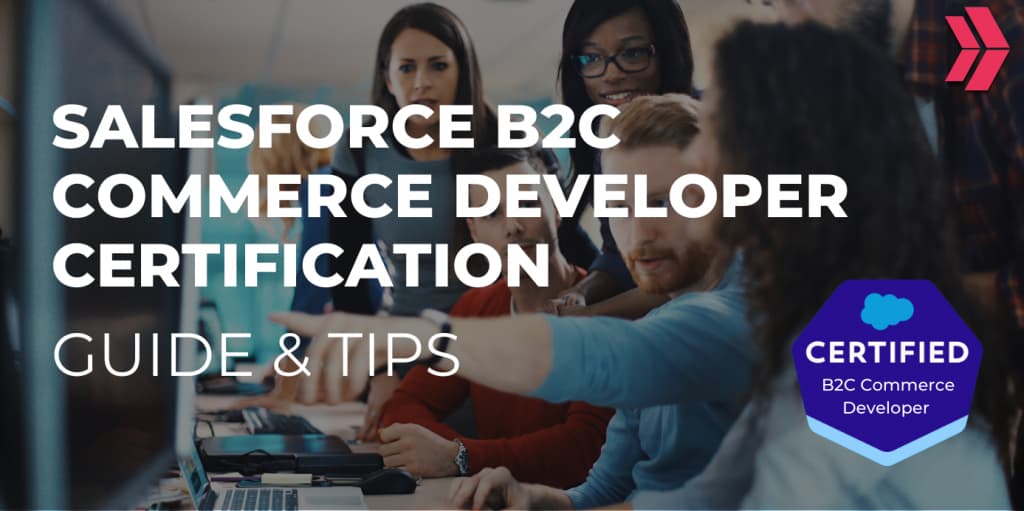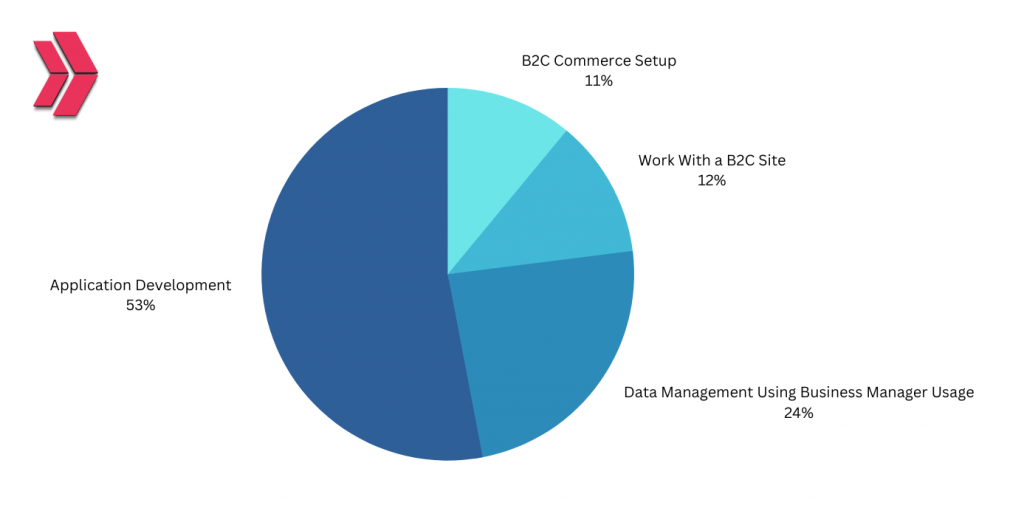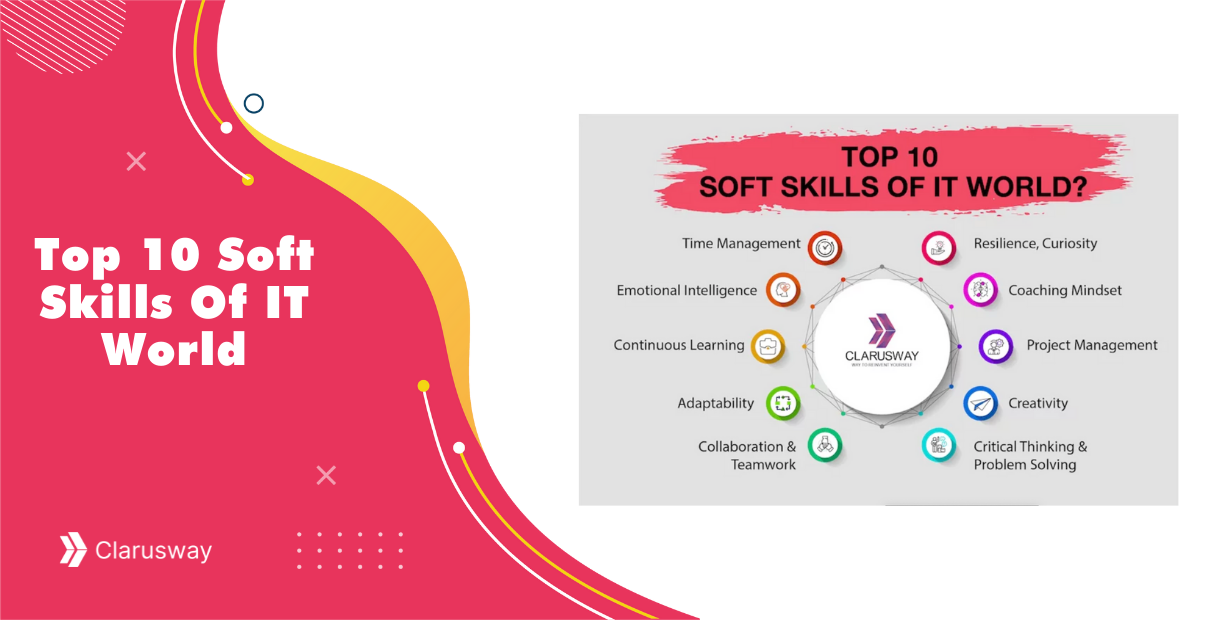The Salesforce B2C Commerce Developer certification is intended for persons with expertise as Salesforce B2C Commerce Digital developers. This certificate is intended for Salesforce customers, partners, and employees who wish to show their proficiency in developing an eCommerce solution using B2C Commerce.

What are the Key Topics for Salesforce B2C Commerce Developer?
The B2C Commerce Developer exam is divided into four sections.

B2C Commerce Setup: 11%
- Configure an IDE to deploy cartridges using WebDAV (Given a sandbox environment).
- Import files with Business Manager Import/Export modules. (Given a sandbox instance and data import files).
- Insert the proper sequence of cartridge names into the supplied cartridge route. (Given the code for a storefront site).
- Make a new site to the instance using the Business Manager and configure the default currency and taxation type (Given a sandbox environment).
Work With a B2C Site: 12%
- Handle products, their categorization, inventory, and pricebooks using the product data model. (Given a Business Manager task).
- Utilize Business Manager to allow customers to fulfill storefront orders. (Given a configuration for tasks).
- Using Business Manager to interact with Content Assets, Page Designer, Content Slots, and Content Folders.
Data Management Using Business Manager Usage: 24%
- Alter site search settings to facilitate searching for a specific term or product attribute (Given a business requirement).
- Make and set up a new search refinement and sorting definition for the storefront (Given a business requirement).
- Configuring the logging categories and accessing the logs in Business Manager (Given a debugging requirement or code).
- Exposing a new attribute on a system object attribute in the storefront (Given a business requirement).
- Creating and configuring custom objects if needed (Given a business need to store custom data).
- Using tools to check code success and implementing solutions (Given a problem or performance issue and data).
- Configuring OCAPI permissions for Data and Shop APIs (Given a specification and a sandbox instance).
- Understanding how to apply to the development process (Given a service configuration).
Application Development: 53%
- Coding ISML templates using local include, remote include, components, and other tags (Given a development task).
- Troubleshooting scripts and controllers and verifying outcomes using best practices to debug.
- Creating and extending a JavaScript controller and rendering a template or returning JSON response using models, decorators, factories, or helpers (Given a requirement).
- Designing a new marketing page with page types and components for a marketer to create a page with the Page Designer tool (Given a requirement).
- Using information from a storefront customer, changing the design of a form, adding validation and CSRF protection, and using bindings to process fields (Given a requirement).
- Implementing and improving templates, form definitions, static files, properties files, and permanent object characteristics to guarantee that pages are shown in the intended language (Given localization requirements).
- Creating code that logs non-sensitive data to custom log files at various levels.
- Combine, install, and utilize a service instance in accordance with a given requirement.
- Using hook extension points for extending functionality or capturing an event (Given a use case).
- Determine the issues and adapt the code to meet best practices for both performance and scalability (Given code that violates documented best practices).
- Using OCAPI Shop and Data APIs to connect an external system (Given a business requirement).
- Performing a scheduled task, developing jobs and writing job scripts (Given a business requirement).
B2C Commerce Developer Exam Tips
Please take into account the following Trails and Modules on Trailhead for independent study:
- Introduction to Business Manager Trail
- Salesforce B2C Commerce for Developers Module
- Salesforce B2C Commerce Launch Readiness Module
- Develop for Salesforce B2C Commerce Trail
- Salesforce B2C Commerce for Developers Module
- Architecture of Salesforce B2C Commerce Module
- Tools & Resources for Salesforce B2C Commerce Developers Module
- Salesforce B2C Commerce Cartridges Module
- Headless Commerce Basics Module
- Build Your Ecommerce Site with Salesforce B2C Commerce Trail
- Salesforce B2C Commerce Import & Export Module
- Salesforce B2C Commerce Scheduled Jobs Module
- Salesforce B2C Commerce Page Designer for Developers Module
- B2C Commerce Storefront Implementation Module
- Commerce Cloud Basics Module
- Commerce Cloud Features Module
In most cases, having a certificate proving competency in the Salesforce B2C Commerce Developer role is required, and the aforementioned tasks are what are necessary to take the exam in a timely manner. Using the above study strategies and tips, you should concentrate the list of the key topics you need to learn. Stop worrying about what others and just study for the test!
How to Study B2C Commerce Developer?
The main steps listed below are the best way to prepare for the certification exam.
- You should learn more about the afore-mentioned B2C Commerce Developer certification requirements, such as the requisite knowledge and skills. To that end, we suggest you consult the course outline available on the Clarusway Salesforce Course and then get in touch with an advisor.
- As a first step, you had better focus on the self-study materials as Salesforce B2C Commerce documentation.
- The Salesforce Certifications Guide and Salesforce’s official Trailhead Exam Guide are two resources you should read thoroughly. These will give you a brilliant overview of the various topics you need to know for the test.
Who’s the Ideal Candidate for Salesforce B2C Commerce Developer?
The Salesforce Certified B2C Commerce Developer examination is intended for eCommerce developers with at least 1 year of developer expertise and 3 to 6 months of encounter in a B2C Commerce Developer position.
The B2C Commerce Developer applicant has the following knowledge, abilities, and experience:
- B2C Commerce architecture.
- Interaction of B2C Commerce elements: promotions, categories, master catalogs, inventory, products, storefront catalogs cart, checkout, price books.
- The pieces contained within SFRA and the effect of an update to either SFRA or B2C Commerce.
- Using Salesforce B2C Commerce, create, explore, and develop an e-commerce site.
- Installing the SFRA sample site and downloading the code.
- Using custom coding or provided functionality as more appropriate, based on SFRA components, and code accordingly.
- Using Business Manager to run an e-commerce site.
- Installing and using an Integrated Development Environment (IDE) for site code.
- Using REST-based API to access Open Commerce API (OCAPI).
- Using ISML templates for coding.
- How and when to use custom objects.
- Writing business logic in B2C script files.
- Using the right tools to troubleshoot and optimize site code and configuration.
- Using Node and Git.
- Importing/exporting data (catalog, orders, inventory, system objects) using B2C Commerce best practices to process objects.
For a detailed Salesforce training, you can consider taking the Clarusway Salesforce Admin and Developer Course.




